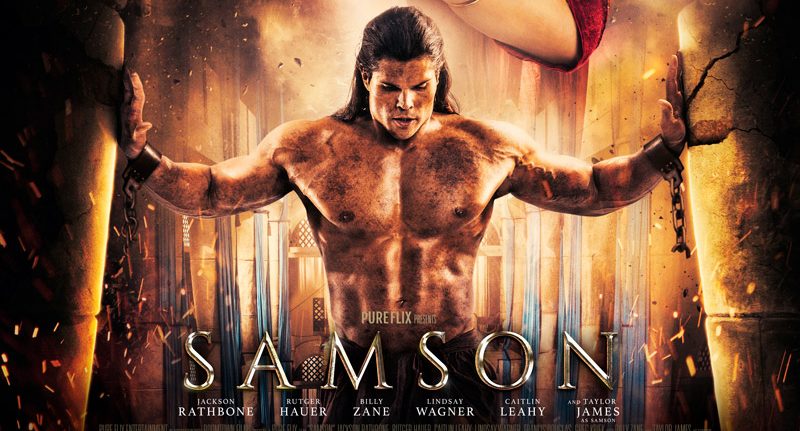#Samson (PureFlix) Heroism Reviews Alpha

Pureflix Studios' first attempt at a direct action/epic for their Christian audience is an ambitious step away from their core product of lightweight comedies, melodramas and movies about debating God on college campuses.
And it's a real loose effort. Almost like a cycling through of storytelling cliches in the hopes of one day getting better at writing. Which is a common flaw among many of these Christian films.
Samson, played by a tanned Taylor Hayes (like, seriously, I know the bronzer really helps show off this muscles, but he's the darkest person in this film, making him look absolutely nothing like the rest of his family. (That, and a neanderthal-esque brow ridge that Lt. Worf would envy.)) begins the film swiping the Hebrew's tributes to the Philistine's priests of Dagon. Including some irritatingly historically inaccurate Maize corn. Oy. He & his brother Iolas--er, Caleb get noticed by masked Philistine soldiers (boy, those faceless stormtroopers sure help you use the same bit performer again and again!) and a chase ensues.
Whew. Look. This kind of Robin Hood-esque-thief-on-the-run-from-the-city-guard as introduction to your protagonist was played out in the first Dungeons & Dragons movie. And it's bizarre to see. It's not just added to the story, nowhere does an incident such as this appear in the bible, so not only are they pulling this odd "it's okay to steal if we see ourselves as oppressed" mentality that fueled Mohammed at the Battle of Badr, but... did you also imply that the Philistines can't trust the Jews? What does Samson do next? Poison a well? (Wait, he burns some fields later on, scratch that.)
This version of Samson also suffers from the Mary-Sue's lament of "I don't wanna fulfill Muh Destiny". As likeable an actor Taylor James proves in this, neither he, nor the rest of the cast, are being handed much to work with. The non-musthachioed-but-you-really-know-they-want-some-just-for-the-twirling villains do a decent job with what they're handed, (including such acts as "Oh, you won't have to worry about starving because mwa-ha-ha! We're stabbing you!" And "I promised to let you go, killing you is the same is releasing you! Boom! Now yer dad's dead') but their acts of villainy aren't just paint-by-numbers, they also lack scale. Now, Cecil B. Demille, that was a guy who could sell you an Orgy to prove the decadence of the Philistines and still oddly keep it PG!
Meanwhile, Samson goes through a series of back and forth "Stay in your own backyard" tribalistic provocations and retaliations with the Philly crew. And here and there the PureFlix people see fit, or necessary, to embellish.
It's odd to talk about Samson, the biblical Judge's acts, and attempt to create a heroic narrative about them. Even Demille in Samson & Delilah, and in PureFlix's Samson saw a need to find ways to morally temper his violence. Take the example of the 30 Tunics, the wager of riddles at his wedding to the ambigious Philistine girl. (A girl not directly named in Judges, only her hometown is mentioned proper.). In Demille's version, Samson plays the sneak thief, snatching up each man's own clothing from their unguarded homes. This avoids a Hayes-era Samson's killing anyone. The Bruce Macdonald version has him instead come across a cadre of Philistine soldiers (who are implied to have raped some Hebrew Girls, No Less! 'Get 'em, Sam, them's our wammens!) who happen to also be wearing tunics. Well, that's enough rough justification, now Sam can get his tribalistic killing on without having to feel guilty about it!
Except not really, the three bound girls, even as he frees them, are terrified of him, and run away as he asks them to help unclothe the platoon of men he just killpunched. This leaves him in the precarious position of having to touch the dead, breaking one of the taboos set upon him as his geas. The classic "I'm a monster" scene is pretty well performed by Taylor.
But in the analysis of heroism, it's an odd thing to revisit the biblical stories of the Hebrews in a post-modern, globalist age. Like in Black Panther, the questions between being true to your tribe and assimilating with the greater world, one of many conflicting tribes & their viewpoints, is set. Of course, there's no retconning Samson, no politically correct revisionism of his end. His final act is one for his God and his tribe, killing the f*** out of a city temple's worth of Phillistines. Unlike T'Challa, the brutish and hard pressed bronze age of Samson guarantees that the final message can only be "if your tribe is in danger, than f*** Tribe B."
It's a rarity to point out exclusionary tribalism as a virtue. But it's a resonant virtue, as the Tribe is merely an extension of the Band, and that of the Family. The protection of groups of common interest and moral values however, is one of the few ways to guarantee success as a society, and even if a hero may personally chafe at their restrictions, your protagonist will have to weigh the liberality of their own desires against the needs of their larger society. The hero isn't defined as a hero by themslves, but by the society they seek to preserve.
Some final nitpicks, just for fun
- Dagon statue. Okay, kinda historically accurate, but I would have preferred something more.. "fishy".
- I'm pretty damned sure you thresh wheat before storing it in silos. I'm no professional, but that's what guess.
3... Okay is she literally buying wheat by the sheaf so she can have something sticking out of her shopping bag, and French Bread hasn't been invented yet? - That was almost an M. Bison line. This movie really dragged up some of the worst of the 90s.